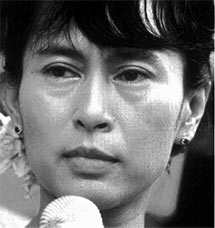Myanmar court mulls more witnesses in Aung San Suu Kyi case
 Yangon - A Yangon court is to decide Friday whether to allow more witnesses to testify in defence of democracy-icon Aung San Suu Kyi who stands accused of breaking the terms of her detention, opposition sources said Thursday.
Yangon - A Yangon court is to decide Friday whether to allow more witnesses to testify in defence of democracy-icon Aung San Suu Kyi who stands accused of breaking the terms of her detention, opposition sources said Thursday.
Originally, the prosecution and defence were scheduled to make their final arguments Friday at a special court set up at Yangon's Insein Prison to try Suu Kyi, her two household helpers and US national John William Yettaw.
But on Wednesday the Yangon Divisional Court agreed to consider a request by Suu Kyi's legal team to present three more witnesses for the defence, Nyan Win, one of Suu Kyi's lawyers, said.
The Yangon Divisional Court will rule on the matter Friday, he said. Nyan Win is also the main spokesman of the National League for Democracy (NLD) opposition party that Suu Kyi leads.
Suu Kyi's trial began on May 11. While the prosecution was allowed to present 14 witnesses, the defence was allowed only one.
The Nobel Peace Prize laureate stands accused of breaking the terms of her house detention by permitting Yettaw, 53, to swim to her home-cum-prison on Yangon's Inya Lake on May 3 and spend two nights there before swimming away.
Yettaw, a member of the Church of Jesus Christ of Latter-Day Saints, faces several charges, including immigration violations for visiting a prisoner while on a tourist visa and local laws for swimming illegally in Inya Lake, state media reported.
The junta's critics have accused it of using the case as a pretext to keep Suu Kyi in jail during a politically sensitive period leading up to a general election planned for next year.
Suu Kyi is the leader of the NLD, which won the 1990 general election by a landslide but has been blocked from power by Myanmar's junta for the past 19 years. Suu Kyi has spent 13 of those years under house arrest.
The new trial of Suu Kyi, whose most recent six-year house detention sentence expired May 27, has sparked a chorus of protests from world leaders and even statements of concern from its close regional allies in the Association of South-East Asian Nations (ASEAN). (dpa)